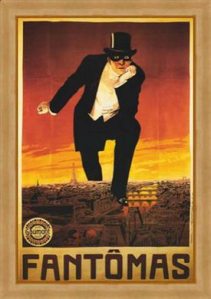 Instead of keeping up to date with the latest offerings from the world of cinema, I have been catching up on a crime serial from its early days. Fantômas is a criminal mastermind who originated in a flurry of 32 detective novels published monthly between 1911 and 1913; the first film adaptation, directed by Louis Feuillade, quickly followed. This is the series I have been watching, on a two-disc DVD set from Artificial Eye (borrowed from a friend — thanks Mr. K!). Altogether there are five episodes averaging an hour in length or thereabouts. One is called ‘The Murderous Corpse’ and contains a chapter titled ‘The Gloves of Human Skin’, but the grisly goings-on are less explicit than these names might suggest.
Instead of keeping up to date with the latest offerings from the world of cinema, I have been catching up on a crime serial from its early days. Fantômas is a criminal mastermind who originated in a flurry of 32 detective novels published monthly between 1911 and 1913; the first film adaptation, directed by Louis Feuillade, quickly followed. This is the series I have been watching, on a two-disc DVD set from Artificial Eye (borrowed from a friend — thanks Mr. K!). Altogether there are five episodes averaging an hour in length or thereabouts. One is called ‘The Murderous Corpse’ and contains a chapter titled ‘The Gloves of Human Skin’, but the grisly goings-on are less explicit than these names might suggest.
Fantômas is sometimes known as the ‘Lord of Terror’ or the ‘Emperor of Crime’. Played by René Navarre, he is a thief, a killer, an elusive mystery man without a clear history or conscience but with formidable powers of disguise, escape, persuasion, and nefariousness. Imagine Professor Moriarty crossed with an evil Houdini, infused with a cold touch of Rasputin and a penchant for dressing up, and you’re close. Contrary to the general human desire to see wrongdoing righted, and even punished, Fantômas’s recurring ability to evade justice gives the films a frisson of their star’s immorality.
This phantom-like villain moves in and out of alliances with criminal gangs and with the unfortunate Lady Beltham, a lover torn between helpless attraction for Fantômas and horror at his awful actions. The stories comprise successive cat-and-mouse games between Fantômas and his dogged pair of pursuers, Inspector Juve and his journalist friend Fandor. Or is Fantômas in fact Inspector Juve? Their lives become so entangled that this outlandish possibility is hinted at more than once, and underscores a level of uncertainty that is unusually high even for the genre. The anti-hero’s name wasn’t even ‘Fantômas’ to begin with: Kim Newman reports that authors Marcel Allain and Pierre Souvestre called him ‘Fantômus’, but their publisher misread the name in their synopsis, and the mistaken form was adopted.
 The Fantômas character influenced not just the crime genre but the avant-garde movement, and gave rise to various plays, comics, radio shows, and TV and film adaptations scattered through the twentieth century. Cult rocker Mike Patton (of Faith No More) named his experimental supergroup ‘Fantômas’. Even Donald Duck got in on the act. Decades earlier, Salvador Dalí and Rene Magritte were fans, and they weren’t the only surrealists to take to Fantômas. Georges Sadoul, Jacques Prevert, Yves Tanguy and Raymond Queneau are reported to have spent entire evenings discussing the films. (Prevert’s name was unfamiliar to me until I looked it up and saw that he wrote the sublime Les enfants du paradis.)
The Fantômas character influenced not just the crime genre but the avant-garde movement, and gave rise to various plays, comics, radio shows, and TV and film adaptations scattered through the twentieth century. Cult rocker Mike Patton (of Faith No More) named his experimental supergroup ‘Fantômas’. Even Donald Duck got in on the act. Decades earlier, Salvador Dalí and Rene Magritte were fans, and they weren’t the only surrealists to take to Fantômas. Georges Sadoul, Jacques Prevert, Yves Tanguy and Raymond Queneau are reported to have spent entire evenings discussing the films. (Prevert’s name was unfamiliar to me until I looked it up and saw that he wrote the sublime Les enfants du paradis.)
The Fantômas silent serial is no masterpiece, but it is a very interesting window into an earlier world, and offers plenty of fun to fans of pulp fiction and to anyone interested in silent film or cultural history. The naturalistic acting, unusual for the era, bolsters the films’ realism and strengthens the (mild) shocks of their occasional violence, cruelty, and perversity. The musical score is excellent and adds considerably to the tension and thrills. Many scenes have an old-world spookiness with a characteristically creaky appeal. Throughout, the films seep with intrigue and suspense, melodrama and mystique. I’m biased, no doubt, by my great fondness for silent films, but you probably already have a fair idea if this is likely to be to your taste or not. For a flavour (albeit accompanied by a modern soundtrack), here’s a montage:
Further reading:
Fantômas: The Emperor of Crime.
The Fantômas website.







Hi there, very good synopsis. The name Fantomas caught my attention in the post. A few years ago I read the comic-novel called “Fantomas contra los vampiros multinacionales” (Fantomas against the mutinational vampires) written by Julio Cortazar. I never investigated deeply this character, so thanks again for the review. Interesting recollection.
Here’s more info on the book for those interested (the author had a bit of a late surrealism sometimes)
http://en.wikipedia.org/wiki/Fantomas_contra_los_vampiros_multinacionales
Best Facundo
Thanks for your comment, facundo. Cortazar’s Fantomas contra los vampiros multinacionales sounds very interesting. From its title, I would never have guessed that it is about the Russell Tribunal! (A couple of paragraphs here are worth reading.)
Pingback: Culch.ie » Blog Archive » Culchie Catch-Up (8)
Pingback: Culch.ie » Blog Archive » The Vampires of Wartime Paris